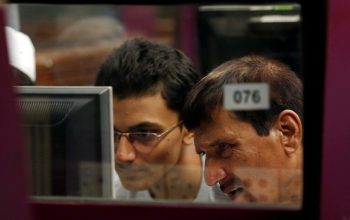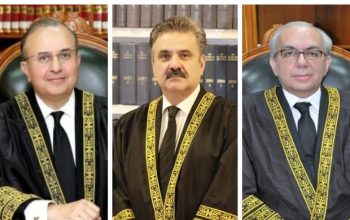On the first anniversary of the May 9 violence, it is evident that the dust has not settled yet as neither the civil-military leadership, nor PTI founding chairman Imran Khan and his party are ready to take a step back to end the ongoing stalemate, which has been keeping the nation on its toes for a year now.
Throughout the day, statements kept coming from the government and military leadership condemning the violent events while assailing the PTI and its incarcerated founding chairman for them.
The PTI, however, claimed that the May 9 mayhem was a “false-flag operation” and blamed the security establishment for it.
In the past few days, several crucial developments were witnessed that focused on the May 9 riots, its aftermath and revealed what views both sides hold on what the military termed a “Black Day” in the country’s history.
On May 7, the army sought a sincere and public apology from former premier Imran. Through a news conference held by the Inter-Services Public Relations (ISPR) director general, it also asked the PTI founding chairman to shun what it described as “politics of anarchy and hate” to revive his political fortunes.
However, Imran has reportedly refused to tender an apology over the May 9 violence when some journalists asked him about it during a court hearing inside Rawalpindi’s Adiala Jail.
The PTI went a step ahead and declared that the ISPR DG’s news conference was a “pack of lies, full of contradictions, venomous, and devoid of logic”.
Imran and PTI have been demanding that a judicial commission, which is not subservient to the military, should be formed to probe into the violent events on last year’s May 9.
In the past couple of weeks, the PTI issued a white paper on polls rigging while Imran wrote an opinion piece in British newspaper Telegraph — both blaming the security establishment for the May 9 violence.
In addition, Imran once again tried single out the army chief in his article.
On the recent May 9, the government said there would be “no absolution” for those who had orchestrated last year’s riots.
It emphasised that it would go after those who had ‘revolted’ against the State, while the army ruled out reaching any ‘compromise’ with the May 9 planners and executors.
On May 9, 2023, the installations of the security establishment were attacked allegedly by enraged PTI activists and supporters after the law enforcement authorities arrested Imran for the first time from the premises of the Islamabad High Court in connection with a corruption case.
Back then, the PTI declared that arresting Imran would be tantamount to crossing its red line.
Following the attacks on its installations including the martyrs’ memorials, the military declared May 9 as a “Black Day”, describing it as a “dark chapter” in the country’s history.
NUML University’s Professor Tahir Naeem Malik said on one hand, Imran and PTI were trying to hold talks with the ‘powerful circles’ as they believed that only they could deliver what the party wanted.
However, he added that on the other, they were blaming the security establishment and trying to single out the army chief. “Both these things can’t go hand in hand.”
Prof Malik was of the opinion that the PTI should not treat the security establishment as a political party as its approach was much different.
He added that it was time for the PTI and its leadership to figure out a way to cool down tensions as continuous escalation would not produce the desired results for the party in the near future.
Referring to Imran and PTI’s extreme positions, Malik suggested that the party should revisit its strategy and carefully examine what results its confrontational policy had yielded so far. He continued that the PTI should consider the future that awaited it if the party continued treading the same path.
Husain Haqqani, a former Pakistani ambassador and currently a scholar at Washington DC’s Hudson Institute as well as the Anwar Gargash Diplomatic Academy in Abu Dhabi, said the PTI was a strong believer of shaping matters through narratives.
Citing examples, he said the PTI has spun a narrative that declared Imran as its red line and banked its hopes on his support for the security establishment.
The second narrative, the former envoy noted, began when the PTI started claiming that the last year’s May 9 violence was a “false-flag operation” without sharing any evidence when no support came from within the military after Imran’s arrest.
Sharing his analysis, Haqqani said the May 9 violence gave a message to the military leadership that if the army did not help a political party, then it would opt for a direct confrontation with the security establishment.
In addition, the former envoy to the US said the military leadership had also realised that Imran was a “reckless” populist leader and his followers became leftists, rightists or Islamists — depending on his mood.
Giving the example of the MQM’s founder, Haqqani said his party was still in the government but he had been politically eliminated, fearing the same fate for the PTI as it only wanted to talk to the ‘powerful circles’.
Haqqani felt that the chances of ending a stalemate between the security establishment and PTI were not bright so far as Imran still insisted that he would reconcile with the other side on his own terms.
The ex-envoy noted that history told us that it had always been the ‘powerful circles’ which made the other side agree to what they wanted and in return provide it with some concessions.
“When someone goes in with the mindset of I will have all or nothing, the chances of ending up with nothing are more than gaining everything.”
Read the full story at the express tribune website.


